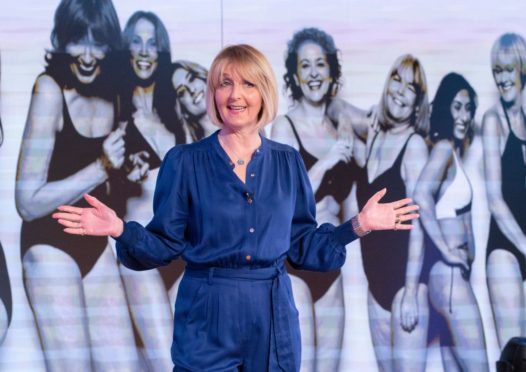
The menopause almost killed Sharon MacArthur. Overcome by debilitating fatigue while driving her car, the high-flying careerwoman – then 49 – momentarily fell asleep behind the wheel.
“Fortunately I didn’t swerve or crash but I was terrified when I nodded myself awake and realised what had happened,” she recalls.
“For many months after that, when I was driving, I would pull over into a lay-by every half hour for a power nap. I was petrified I would fall asleep and die.”
MacArthur’s near-death experience was one of several prompts that sent her on a journey to help the estimated 4.5 million working women in the UK who, like her, are affected by menopause.
Under the name of Miss Menopause she now educates workplaces about something she believes for too long has been ignored.
And it’s not just employers turning a blind eye to it. The former FTSE 100 company executive was running a successful business coaching firm when she was besieged by baffling health concerns.
As she was mentoring powerful businesspeople on how to improve their management skills and boost their confidence, outside of the office the entrepreneur was losing her own vigour and suffering from night terrors, night sweats and memory lapses.
“I just thought I was terribly unwell,” says MacArthur, 52, whose symptoms began when she was 47. “I couldn’t figure out why I had to lie on the settee for a ‘nana nap’ in the afternoons, why I was so hot, why I woke up one day unable to remember the computer password I’d had for six years.”
When a friend suggested Sharon might be going through the menopause she was, by her own admission, “disgusted”.
“I was still menstruating, and I was under the misconception that the menopause was this linear process where your periods changed, then you started getting symptoms, then your periods would stop,” she remembers.
“In my ignorance I also thought I was far too young and that menopause affected women in their 70s.
“When I started doing research, I realised I wasn’t too young at all.”
In recent weeks TV host Davina McCall has spoken about her own experiences in Channel 4 documentary Sex, Myths And The Menopause.
Although the subject is being spoken of more openly now, MacArthur says she was completely blindsided four years ago not only by what she described as “pretty violent” hormonal changes but by her lack of awareness as to what was going on.
She started asking every woman she met – friends, strangers, the businesswomen she coached – what they knew about the menopause, and quickly learned she wasn’t alone in her knowledge gap.
“There’s been zero education about menopause,” she says. “At school we were all given the ‘girl chat’ about periods because it was something we were all going to experience whether we liked it or not.
“It meant that when we did start menstruating, we knew what was happening to our bodies and we were prepared for it.
“So why isn’t there a ‘girl chat’ for menopause, this other major life event that affects all women?”
Determined to fill that void, MacArthur decided three-and-a-half years ago to become a menopause educator and provide that ‘girl chat’ in workplaces across the country.
Miss Menopause meets with groups of employees and decision-makers in companies throughout the UK – such as the Chartered Institute of Personnel Development Scotland and the NHS – to share key information about the menopause, from the symptoms to treatments, and encourage open dialogue about it.
Taking the conversation into the corporate environment is important because MacArthur says it’s a key area where women are being let down.
“I was speaking to women who had left their jobs because they didn’t know what was happening to them and the organisations they worked for weren’t stopping them from going,” she explains. “These women would tell me they’d lost their confidence, they didn’t feel capable and they thought they had early-onset Alzheimer’s.
“It frustrated me because men in their mid-40s are powering through their careers, enhancing their pensions and looking to take on more responsibility.
“At that age, so many women should also be hitting their professional stride – but then the menopause symptoms begin and throw them off kilter.”
MacArthur warns managers they will experience a talent drain if they don’t provide women with a menopause-friendly workplace.
“I don’t necessarily think companies need to create policies around menopause, they just need to educate their staff – including the men – and demonstrate through action that it’s not this unspoken taboo,” she explains.
“Make it part of your inductions and show your staff that you care abourt this subject.
“It doesn’t have to cost anything – for example some companies I’ve spoken to have set up menopause cafes or menopause groups.”
Giving people space and permission to talk about their experiences is important. From chatting with thousands of women, MacArthur has observed that many suffer in silence and feel a deep sense of loneliness, and often shame, about their menopausal symptoms.
Some women have shed tears in her sessions upon hearing a hidden part of their lives discussed so frankly. “I also find that women are so used to caring for everyone else that they forget to care for themselves,” she says.
“One woman I spoke to said she had bled every single day for a year. When I asked what she had done about it, she said ‘nothing’.
“How did we get to a place where bleeding every day for 12 months is something to be endured and not even investigated?”
When people get together to talk about menopause, they have the opportunity to share advice on what has helped them.
It took nearly three years and much trial and error for MacArthur to find a menopause treatment that worked for her.
After experimenting with sage tablets and magnesium baths and being wrongly prescribed anti-depressants, she eventually asked her GP for Hormone Replacement Therapy (HRT) after researching it extensively and says it has completely changed her life.
“My symptoms all faded away – it was a miracle,” she recalls.
“HRT often gets such a bad press but what I always say to women is it’s your body, your choice, and you must do your research, get the facts and not listen to what your Auntie Mary thinks.
“You’ve got to get busy finding the right solution for you and your body, because on average the menopause lasts between five and seven years. Do you really want to put your life on hold for all that time?”
Union leader calls for bosses to act on menopause to protect vital skills and experience
Women workers are being failed by employers making no provision for the impact of menopause, Scotland’s trade unions have warned.
STUC general secretary Roz Foyer called for a sea-change in workplace attitudes as midlife women struggle to get simple adjustments to their working conditions.
She warned the failure of employers to properly address menopause-related issues meant working women were missing out on promotions, forced to go part-time, and, sometimes, compelled to end their careers early.
Research suggests 4.5 million menopausal women working in the UK and nine out of 10 say the often debilitating symptoms have adversely affected their performance and prospects. While a number of employers have introduced menopause policies, Foyer believes more must follow. She said there was more awareness of the issues but called for action saying words were not enough.
She said: “The menopause is an equality issue and is of importance to us all, it undoubtedly contributes to the gender pay gap and causes a great deal of stress and anxiety to many. At present, far too many employers still do not have an adequate menopause policy.
“Truly supporting workers going through the menopause means allowing flexible working, to help women who are experiencing irregular sleep patterns and fatigue. It means reasonable adjustments to policies, so no woman is detrimentally affected due to going through the menopause.
“It also means advice, awareness raising and support for menopausal women and colleagues via training. Additionally, workplaces should be providing quiet areas and access to fans.
“At present, too many workplaces are still not providing what is needed, with many workers having to fight tooth and nail to get reasonable adjustments.
“We need to see real change and for the Scottish Government to ensure adequate specialised health services are in place to support women through this transition.”
There are around 13 million women aged between 16 and 64 currently in employment in the UK, with those aged 45 to 55 most likely to experience the menopause. Symptoms are varied but can include hot flushes, an inability to sleep, reduced concentration and depression, all of which can affect performance at work.
A study by the British Medical Association last year found highly experienced doctors leaving GP partnerships or other medical positions early because they were struggling to cope with symptoms but had no support from management or peers.
More than 90% of the study’s 2,000 respondents said their symptoms had affected their working lives but 38% said they were unable to make the changes they needed to working patterns to cope with symptoms. Twenty years ago Heather Currie, a gynaecologist and associate medical director at Dumfries and Galloway Royal Infirmary, launched Menopause Matters, a website providing information about the symptoms and treatment.
She said: “There’s much more awareness of the consequences and impacts of the menopause and on the later health impacts, but there is still a need to talk and be more open about it, especially in the workplace.”
Campaigners say employers should train line managers to be more aware of the menopause and its symptoms, offer those going through it flexible working hours to allow them to better cope with sleepless nights, and provide desktop fans.
Scottish Labour health spokesperson Jackie Baillie said it was time for the stigma around speaking about the menopause to end.
She said: “Scottish Labour fully supports employers taking action to implement workplace menopause policies to reduce stigma in the workplace and to ensure that women are supported in what they are going through. Part of this has to be employers allowing flexible working and working from home for women experiencing the menopause.
“Far too few health boards provide specialised menopause clinics and it is vital that GPs and other health professionals are fully aware of the range of symptoms that can present themselves due to the menopause.”
In its manifesto for last month’s Holyrood elections, the SNP promised a public health campaign to remove stigma and raise awareness of menopause symptoms, and to improve access to specialist services.
The Scottish Government is committed to raising awareness according to Equalities and Older People Minister Christina McKelvie, who said: “We don’t talk enough about the menopause and the impact it can have on women.
“To reduce the stigma of the menopause, we are committed to improving women’s health inequalities and raising more awareness about the menopause. Our First Steps plan commits to publishing the recommendations of the Women’s Health taskforce and produce a Women’s Health Implementation Plan in the first 100 days of this government.
“We have already established a Menopause Specialists Network which is meeting regularly online to provide consistent advice and peer support to healthcare professionals, including primary care by providing access to a menopause specialist for advice, support, onward referral, leadership and training.
“Being supported in the workplace is an essential part of actions going forward.
“Our Gender Pay Gap Action Plan recognises the need for gaining a clearer picture of the issues faced by women transitioning through the menopause and the need for improving workplace practices to support women.
“We will continue to work with women’s organisations and trade unions to identify other areas where action may need to be taken.”
Having a policy makes it easier to talk. It’s not some big taboo subjectRona Wall, head of occupational health and safety at NHS Greater Glasgow & Clyde
We launched our menopause policy in January 2020, after having worked on it for several months before that.
There had been a lot of interest in establishing a policy like this from our workforce and our trade union colleagues.
For context, 78% of our employees are female and the average age is around 48. That’s a lot of women who potentially are at or close to the point of going through the menopause, so we were very keen to have a policy in place to help manage their symptoms and support them.
The policy encourages managers and employees to have regular, informal conversations about the menopause and it also promotes reasonable adjustments being made in the workplace to accommodate symptoms, such as the provision of desktop fans to help with hot flushes and the consideration of flexible working hours for those experiencing sleep disruption.
Signposting is important, too, whether that’s encouraging people to discuss symptoms with their GP or making them aware of other sources of support such as counselling.
As the head of occupational health and safety, I will sometimes get referrals from managers for staff who are struggling, and frequently there is some link between the struggles they are facing and their menopausal symptoms.
I think one of the biggest benefits of a workplace having a menopause policy – and the one that has helped our employees most – is that it gives the manager and the member of staff the confidence to have a conversation about it, whereas previously it felt like a bit of a taboo subject.
The feedback across the organisation about the policy has been very positive and while it’s hard to assess its impact thus far because of its implementation coinciding with the pandemic, I do anticipate we will see a long-term benefit from it.
In my view, there needs to be recognition across all workplaces of the challenges that menopausal women face.
There’s a range of symptoms women present with and it’s important for there to be a greater awareness of what these are, so that the right support is in place for them and they are given the authority to openly discuss what they’re going through.

Enjoy the convenience of having The Sunday Post delivered as a digital ePaper straight to your smartphone, tablet or computer.
Subscribe for only £5.49 a month and enjoy all the benefits of the printed paper as a digital replica.
Subscribe

